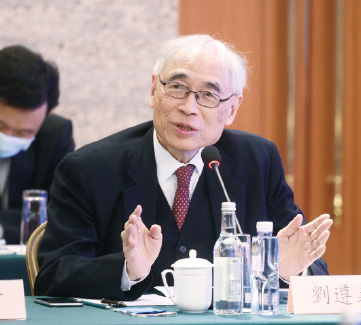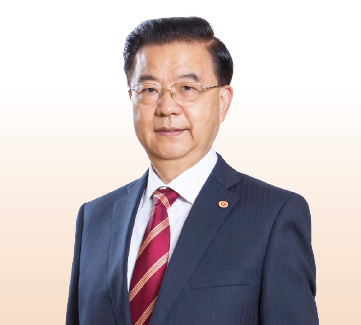RMB now ranks as the world's fifth-largest global foreign exchange reserve currency, and its ranking as a global payment currency is also improving constantly. Hong Kong has always been a testing ground for RMB internationalization, so how it can play a greater role in helping RMB internationalization in a timely manner has attracted attention from all sectors.
Lawrence Lau
Hong Kong Should Further Promote Wide Use of RMB in Global Financial Markets
Lawrence Lau, Vice-Chairman of Our Hong Kong Foundation, Ralph and Claire Landau Professor of Economics at The Chinese University of Hong Kong, and Kwoh-Ting Li Professor in Economic Development (Emeritus) at Stanford University, said that China-US rivalry,  which will be the new normal in the next ten years, could accelerate RMB internationalization. Hong Kong should leverage its advantages as a global offshore RMB centre to further promote the widespread use of the RMB in the global financial markets.
which will be the new normal in the next ten years, could accelerate RMB internationalization. Hong Kong should leverage its advantages as a global offshore RMB centre to further promote the widespread use of the RMB in the global financial markets.
Lau pointed out that the world's economic centre of gravity has shifted from North America and Europe to East Asia in recent years. It is believed that China's economic growth rate will surpass that of North America and Europe in the coming ten years. Lau said that by 2033, China's real GDP is expected to be equal to that of the US, reaching USD3.42 trillion, and its national savings rate could exceed 40%. As the wealth of the Mainland's households and organizations grows, it will help drive demand for investment assets, especially overseas investments.
The use of RMB in Hong Kong should be more convenient
In Lau's view, Hong Kong should further promote the widespread use of the RMB in the global financial markets. He expected that China-US rivalry would inevitably lead to economic decoupling between the two countries, which would help accelerate the internationalization of the RMB. For example, some overseas Chinese companies may return to the Mainland and Hong Kong can strengthen cooperation with Europe, so China is a very important customer for Hong Kong.
He expected that China-US rivalry would inevitably lead to economic decoupling between the two countries, which would help accelerate the internationalization of the RMB. For example, some overseas Chinese companies may return to the Mainland and Hong Kong can strengthen cooperation with Europe, so China is a very important customer for Hong Kong.
Lau further explained that the use of the RMB in Hong Kong should be made more convenient since Hong Kong's financial institutions have considerable amounts of offshore RMB deposits. To further use the RMB in the capital markets, investors have been allowed to trade approved securities on the HKEX using the dual counter system, which permits the use of RMB, and to relax the restrictions on the use of the Hong Kong dollar to trade securities in the Shenzhen Stock Exchange.
Use local currencies for trade settlement to promote RMB internationalization
Referring to the macroeconomic trend of RMB internationalization, Lau stressed that compared to using a third country's currency for settlement, when using local currencies for bilateral trade settlement, the two countries only need to have one exchange of currencies and assume exchange rate risks once, thus actually reducing each other's transaction costs and exchange rate risks, which is beneficial to both countries. For example, Indonesia and Russia settle their international economic dealings with China in RMB and their local currencies, rupees and rubles.

At present, the increasing weaponisation of the US dollar-based SWIFT system is forcing countries to seek alternatives. The use of US dollars is expected to gradually decrease going forward. Lau said that if the share of RMB settlement in global trade can reach the current level relative to Japan's trade share in Japanese yen, i.e., increase from 2.3% to 17.2%, there is a chance that the RMB would become the world's third largest settlement currency.
Successful Mainland companies driving the development of Hong Kong's capital markets
Therefore, Lau is very optimistic about Hong Kong's prospects as an international financial centre. He said the strong purchasing power of Mainland investors, coupled with the emergence of a large number of successful Mainland companies, will help boost the prosperity and development of Hong Kong's securities and financial industries.
Tse Yung-hoi
Leverage Hong Kong's First-mover Advantage to Speed Up RMB Internationalization
“Promoting the internationalization of the RMB in an orderly way” is clearly pointed out in the report to the 20th National Congress of the CPC. Tse Yung-hoi, the Chamber's Vice-Chairman and Chairman of BOCI-Prudential Asset Management Limited, said that RMB internationalization, as stated by the country, is not intended to replace the US dollar, but to go hand in hand with the “Belt and Road” Initiative (B&R) to provide an additional public product for the world in order to better maintain peace, justice and fairness in the world.
internationalization of the RMB in an orderly way” is clearly pointed out in the report to the 20th National Congress of the CPC. Tse Yung-hoi, the Chamber's Vice-Chairman and Chairman of BOCI-Prudential Asset Management Limited, said that RMB internationalization, as stated by the country, is not intended to replace the US dollar, but to go hand in hand with the “Belt and Road” Initiative (B&R) to provide an additional public product for the world in order to better maintain peace, justice and fairness in the world.
RMB's circle of friends gradually taking shape
Tse said that according to statistics, over 30 countries are gradually using the RMB for settlement, which will help accelerate the process of RMB internationalization. “First, the Export-Import Bank of China and Saudi Arabia achieved the first loan cooperation in RMB in March this year, and then the governments of Brazil and Argentina announced that trade with China would be settled in RMB for trade in goods.”
Referring to countries and regions that advocate “de-dollarization”, Tse said that they can be roughly divided into five categories that include: countries sanctioned by the US; countries whose economies have been manipulated by the US for a long time; countries that are unwilling to take side between China and the US; countries that are friendly to China; and B&R countries and related organizations. In his view, these countries and organizations, which are also proactive participants and active drivers of the acceleration of RMB internationalization, have formed an “RMB's circle of friends”.
Five directions for boosting RMB internationalization
Tse said that Hong Kong accounts for more than half of the world's offshore RMB deposits; 70% of the country's cross-border trade RMB settlements are carried out in Hong Kong, and 80% of global offshore RMB bond issuance is done in Hong Kong. At the same time, Hong Kong is the only platform for Bond Connect, and this year, HKEX launched an HKD-RMB dual currency counter scheme involving 24 blue-chip stocks.
“Hong Kong must actively leverage its first-mover advantage in the acceleration of RMB internationalization to make new contributions.” In Tse's view, to achieve the aforesaid goal, Hong Kong could further support RMB internationalization in five directions. The first is that HKEX could increase the number of RMB stocks to provide more investment opportunities for overseas offshore RMB funds. The second is to allow Mainland residents to use the RMB to directly trade Hong Kong stocks through Shanghai-Hong Kong Stock Connect and Shenzhen-Hong Kong Stock Connect, thus increasing the trading volume in Hong Kong.
Creating a RMB trading and investment platform
The third is to attract companies from B&R countries to come to Hong Kong to list and trade their stocks in RMB in order to promote the internationalization of the RMB stock platform. The fourth is to set up a connect scheme with the Mainland for trading of precious metals and oil & gas futures in RMB in order to improve Hong Kong's RMB trading product offerings as a financial centre. Finally, Hong Kong could hold an annual international RMB finance forum to study and brainstorm ideas on hot issues such as financial security, benefits sharing, and institutional protection.
protection.
Tse stressed that because Hong Kong is an indispensable and important node in the acceleration of RMB internationalization, all sectors of society must broaden their international horizons and integrate into overall national development to create a full-featured RMB trading and investment platform in order for Hong Kong to become a true offshore RMB hub.




